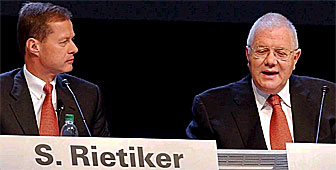
Centerpulse CEO Rietiker fired

Stephan Rietiker, the chief executive of Centerpulse, formerly Sulzer Medica, has been sacked by the board after less than one year in the job.
Differences of opinion over how the company should be run and its future direction were behind the CEO’s surprise departure, said Erwin Schärer, a spokesman for the company.
The medical device manufacturer also announced on Tuesday a management reorganisation, with the chairman of the board, Max Link, taking over as CEO.
The firm, whose headquarters are in Zurich, will now comprise four divisions, with the fifth – the Biologics division – being disbanded and integrated into Centerpulse’s other activities.
As part of the reshuffle, the four remaining divisional heads will also join the executive board. “Our four business units must be part of our business decisions and even drive the process,” said Link.
He added that Rietiker had concentrated executive decision-making and this would now change. “He put most of the power in Zurich. I want to give it back to the business units.”
Lack of support
Centerpulse’s new CEO said Rietiker had lacked the support of important members of the organisation and that the decision to fire him was personal.
Schärer added that the decision-making process would also be more market-oriented in the future. “We realised that within executive management that the people who were in touch with the customers weren’t represented,” he said.
The company acknowledged that Rietiker had made “substantial contributions” towards a settlement with patients in the United States who received faulty hip and knee implants.
“The legal agreement has nothing to do with the CEO’s departure,” Schärer told swissinfo.
The settlement will cost Centerpulse up to $1 billion (SFr1.46 billion) and give over 3,500 patients who underwent remedial surgery up to $200,000 each.
Centerpulse also announced on Tuesday that just 12 patients have refused to agree to the settlement. After a one-month appeals period, no other claimants have stepped forward.
Up to 30,000 people were affected by the implants, which were tainted by a lubricant during their production. The artificial joints failed to bond properly with bone, causing pain for many recipients, most of them elderly, and requiring the replacement of the implants.
swissinfo with agencies

In compliance with the JTI standards
More: SWI swissinfo.ch certified by the Journalism Trust Initiative

























You can find an overview of ongoing debates with our journalists here . Please join us!
If you want to start a conversation about a topic raised in this article or want to report factual errors, email us at english@swissinfo.ch.